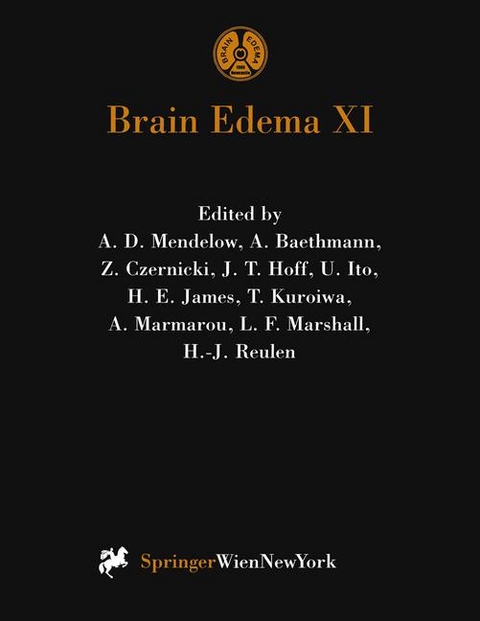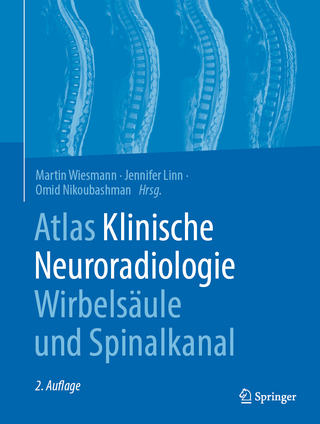
Brain Edema XI
Springer Wien (Verlag)
978-3-7091-7257-5 (ISBN)
- Titel wird leider nicht erscheinen
- Artikel merken
This volume brings together clinical and basic scientists from all over the world. Their expertise in the understanding of brain edema and shifts in brain water compartments has led to a further significant step in our understanding of those diseases characterized by brain edema. This book has also drawn on the expertise of the International Advisory Board of the Brain Edema Society, who have carefully summarized each section, thus providing an easy-to-read summary of the latest advances in each subject. The book is therefore much more than a collection of papers: it represents a critical appraisal and puts each paper into modern scientific context.
The greatest advances have come from the rapid development of modern imaging techniques, especially with magnetic resonance imaging (MRI). Imaging can now produce "water maps” and "metabolic profiles” that bring brain metabolism and water content right into every clinic with access to MRI.
This book provides the background knowledge to understand these pathophysiological changes.
Imaging: 1H-MR Spectroscopic Monitoring of Posttraumatic Metabolism Following Controlled Cortical Impact Injury: Pilot Study (M. U. Schuhmann, D. Stiller, S. Thomas, T. Brinker, and M. Samii); Heterogeneous Mechanisms of Early Edema Formation in Cerebral Contusion: Diffusion MRI and ADC Mapping Study (T. Kawamata, Y. Katayama, N. Aoyama, and T. Mori); Metabolic Changes in Pericontusional Oedematous Areas in Mild Head Injury Evaluated by 1H MRS (B. C. Son, C.-K. Park, B.-G. Choi, E.-N. Kim, B.-Y. Choe, K.-S. Lee, M.-C. Kim, and J.-K. Kang); Malignancy of Brain Tumors Evaluated by Proton Magnetic Resonance Spectroscopy (1H-MRS) in Vitro (Z. Czernicki, D. Horsztynski, W. Jankowski, P. Grieb, and J. Walecki); rCBF in Hemorrhagic, Non-Hemorrhagic and Mixed Contusions After Severe Head Injury and its Effect on Perilesional Cerebral Blood Flow (B. M. Hoelper, M. M. Reinert, A. Zauner, E. Doppenberg, and R. Bullock).- Molecular Mechanisms: Glutathione Homeostasis and Leukotriene-Induced Permeability in Human Blood-Brain Barrier Endothelial Cells Subjected to in Vitro Ischemia (A. Muruganandam, C. Smith, R. Ball, T. Herring, and D. Stanimirovic); Comparison of NAA Measures by MRS and HPLC (P. P. Fatouros, D. L. Heath, A. Beaumont, F. D. Corwin, S. Signoretti, R. H. AL-Samsam, B. Alessandri, P. Lazzarino, R. Vagnozzi, B. Tavazzi, R. Bullock, and A. Marmarou); Influence of the Bradykinin B1/B2-Receptor-Antagonist B 9428 on the Cerebral Microcirculation and Outcome of Gerbils from Global Cerebral Ischemia (J. Lehmberg, J. Beck, A. Baethmann, and E. Uhl); Evolution of Energy Failure after Repeated Cerebral Ischemia in Gerbils (T. Kuroiwa, U. Ito, Y. Hakamata, S. Hanyu, G. Mies, and D. Hermann); Indomethacin and Cyclosporin a Inhibit in Vitro Ischemia-Induced Expression of ICAM-1 and Chemokines in Human Brain Endothelial Cells (W. Zhang, C. Smith, R. Monette, J. Hutchison, and D. B. Stanimirovic); The Selectin Superfamily: The Role of Selectin Adhesion Molecules in Delayed Cerebral Ischaemia After Aneurysmal Subarachnoid Haemorrhage (J. J. Nissen, D. Mantle, A. Blackburn, J. Barnes, T. Wooldridge, B. Gregson, and A. D. Mendelow); Traumatic Brain Injury in Mice Deficient in Poly-ADP(Ribose) Polymerase: A Preliminary Report (M. J. Whalen, R. S. B. Clark, C. E. Dixon, P. Robichaud, D. W. Marion, V. Vagni, S. Graham, L. Virag, G. Hasko, R. Stachlewitz, C. Szabo, and P. M. Kochanek); Increased Immunolocalization of Nitric Oxide Synthases During Blood-Brain Barrier Breakdown and Cerebral Edema (S. Nag, P. Picard, and D. J. Stewart); Biological Functions of Extravasated Serum IgG in Rat Brain (E. Kadota, Y. Muramatsu, K. Nonaka, M. Karasuno, K. Nishi, K. Dote, and S. Hashimoto); Possible Reverse Transport of ß-Amyloid Peptide Across the Blood-Brain Barrier (R. Pluta, A. Misicka, M. Barcikowska, S. Spisacka, A. W. Lipkowski, and S. Januszewski); Reducing Conditions Produce a Loss of Neuroprotective Efficacy of Competitive but not Non-Competitive Antagonists in a Model of NMDA-Mediated Excitotoxicity in Organotypic Hippocampal Slice Cultures (A. K. Pringle, J. Self, and F. Iannotti); Role of Nitric Oxide in Blood-Brain Barrier Permeability, Brain Edema and Cell Damage Following Hyperthermic Brain Injury. An Experimental Study Using EGB-761 and Gingkolide B Pretreatment in the Rat (H. S. Sharma, K. Drieu, P. Alm, and J. Westman); Extracts of Ginkgo Biloba and Panax Ginseng Protect Brain Proteins from Free Radical Induced Oxidative Damage in Vitro (M. S. Siddique, F. Eddeb, D. Mantle, and A. D. Mendelow); p-Chlorophenylalanine, an Inhibitor of Serotonin Synthesis Reduces Blood-Brain Barrier Permeability, Cerebral Blood Flow, Edema Formation and Cell Injury Following Trauma to the Rat Brain (H. S. Sharma, T. Winkler, E. Stälberg, S. Mohanty, and J. Westman); S-100 Serum Levels and Outcome After Severe Head Injury (R. D. Rothoerl, C. Woertgen, and A. Brawanski); A Microstructural Study of Spinal Cord Edema (H. Naruse, K. Tanaka, and A. Kim);
| Erscheinungsdatum | 19.12.2018 |
|---|---|
| Reihe/Serie | Acta Neurochirurgica Supplementum ; 76 |
| Zusatzinfo | XIX, 572 p. 221 illus., 10 illus. in color. |
| Verlagsort | Vienna |
| Sprache | englisch |
| Maße | 216 x 280 mm |
| Themenwelt | Medizinische Fachgebiete ► Chirurgie ► Neurochirurgie |
| Schlagworte | blood brain barrier • brain edema • brain oedema • cerebral metabolism • Ischemia • Trauma |
| ISBN-10 | 3-7091-7257-8 / 3709172578 |
| ISBN-13 | 978-3-7091-7257-5 / 9783709172575 |
| Zustand | Neuware |
| Informationen gemäß Produktsicherheitsverordnung (GPSR) | |
| Haben Sie eine Frage zum Produkt? |
aus dem Bereich


